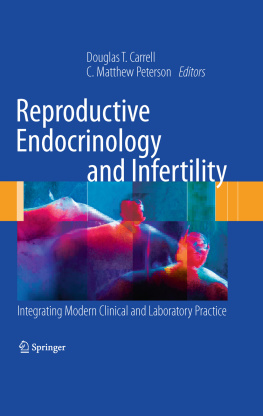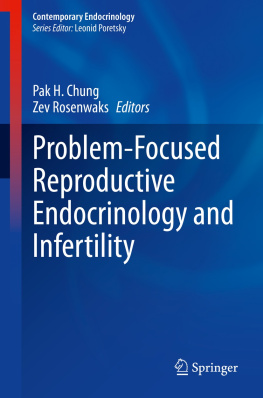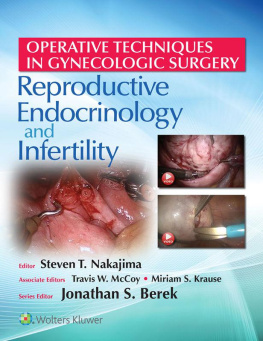1.1 Introduction
The definition of success - To laugh much; to win respect of intelligent persons and the affections of children; to earn the approbation of honest critics and endure the betrayal of false friends; to appreciate beauty; to find the best in others; to give ones self; to leave the world a little better, whether by a healthy child, a garden patch, or a redeemed social condition; to have played and laughed with enthusiasm, and sung with exultation; to know even one life has breathed easier because you have lived - this is to have succeeded.Ralph Waldo Emerson
The other chapters of this book are aimed at assisting an infertility clinic or laboratory director in understanding the clinical, scientific, business, and management principles necessary to establish and maintain a successful organization. But, what is meant by a successful organization? Judging success, in our life or the lives of others, is commonly performed, but nebulous, difficult, and potentially dangerous. The task of defining a successful clinic and laboratory is no easier, and also fraught with danger. However, the definition of success quoted above should on one level reassure all infertility clinics that they are to a certain degree successful since every healthy baby born as a result of the clinics service has indeed caused one life to breathe easier. However, most would agree that truly successful infertility clinics and laboratories have important characteristics beyond pregnancies.
Each medical and laboratory director of an REI clinic has a distinct set of values that define his perception of a successful clinic or laboratory, and the directors values and perceptions likely differ from other directors. So, this chapter is not meant to be a blueprint, rather as a starting point for consideration and discussion.
Perhaps, one of the major difficulties in defining a successful laboratory and clinic is the misconception that success is defined by checking off a list of activities or achievements, analogous to a graduate receiving a diploma after completing a required list of coursework. However, there is no certificate of success for clinics and laboratories, nor is success bestowed as an honorary degree. Arthur Ashe, the respected tennis player and civil rights leader, has said, Success is a journey, not a destination. The doing is often more important than the outcome. In our opinion, establishing a successful clinic and laboratory is similar; destinations are defined, some common to all labs, and the journey is undertaken. However, as situations, regulations, personnel, technologies, and other factors change, new destinations are charted. Therefore, the success in the clinic and laboratory may be looked at as dependent on setting a good course and in the methods employed and the interactions of all during the journey.
The journey of becoming a successful clinical operation and laboratory contains distinct and necessary guideposts necessary to mark the journey. Such guideposts include compliance with legal and regulatory mandates, accreditation, and employing good management principles, and other items. Below are a few brief characteristics that, in our opinion, are evident in all successful laboratories. The characteristics are provided as guideposts, with the inherent understanding that each clinic or labs priorities and circumstances affect the implementation of the characteristics. The list is not complete, but rather a formulation of some essential characteristics, and simple ideas to assist in the implementation of a successful clinic or laboratory. If there is one firm hallmark of successful people and organizations, it is the attempt to go beyond expectations. The successful team will be constantly looking for ways to improve and set new standards in these, and other, characteristics.
1.2 Successful Leadership Principles
There is a fundamental difference between leadership and management. Leadership has been defined as the art of persuading people to work toward a common goal []. In short, a director sets a culture of success, mediocrity, or failure through his leadership.
Four approaches have commonly been used to describe and teach effective leadership. The first approach, the trait approach , is the most commonly considered method and involves defining characteristics of a successful leader []. Such characteristics would undoubtedly include integrity, character, communication skills, patience, passion, energy, vision, credibility, and maturity. According to this approach, the clinical and laboratory directors should continually assess and refine his skills to become more effective. This approach is useful and should be implemented, but it is apparent that other approaches to leadership are also required.
The behavior approach to leadership focuses on the manner in which a person acts, particularly in times of stress or in situations relevant to the rest of the group []. The approach focuses more on the actions than on a defined set of characteristics. This approach accentuates the example set by a director both in routine clinical and lab work, and in striving to move the norms of the operation to higher levels. IVF laboratory directors are often inundated with office work, but this approach highlights the need for a continual, positive presence in the lab itself. Clinical directors are most successful when they grasp the day-to-day operational activities with patients, nursing, laboratory and management staff. The behavioral approach to defining leadership has resulted in the description of various leadership styles, such as authoritative, democratic, and laissez-faire, and others.
The situational approach to leadership maintains that each of these styles may be necessary in different situations []. This theory implies that a leader should be flexible and perceptive to the specific styles and techniques needed for different individuals or situations. In a sense, most effective leaders have learned this approach. A successful director will be authoritative on issues of critical importance, and will do so with the traits described earlier, but will learn that effective mentoring of staff also requires flexibility and patience.
It is important to note that leadership in the ART clinic and laboratory does not just come from the director, but also from supervisors, technicians, nurses, staff, referring physicians, and possibly others. In fact, both positive and negative leadership may, and often is, exerted from a nonmanagerial staff member. This effect highlights the reciprocal approach to leadership and the need to consider the effect and feedback of others on the team and take actions to implement useful input and eliminate negative influences []. For some, this is the most difficult part of leadership.








